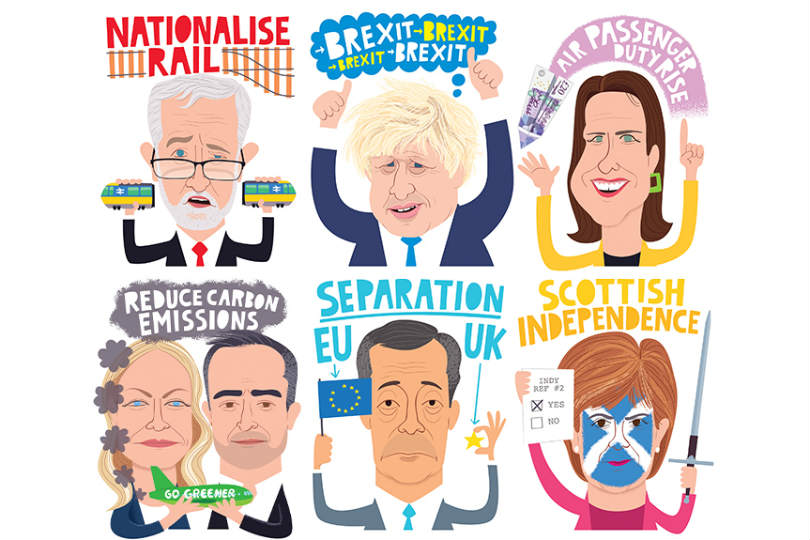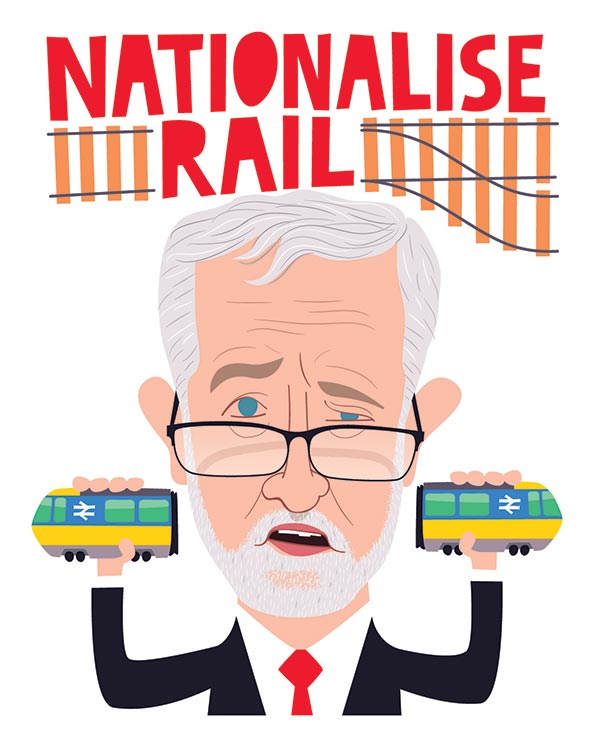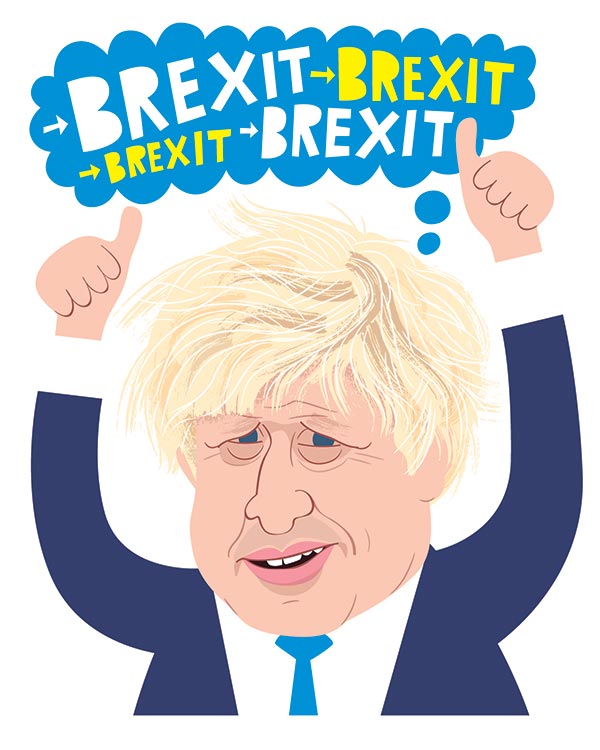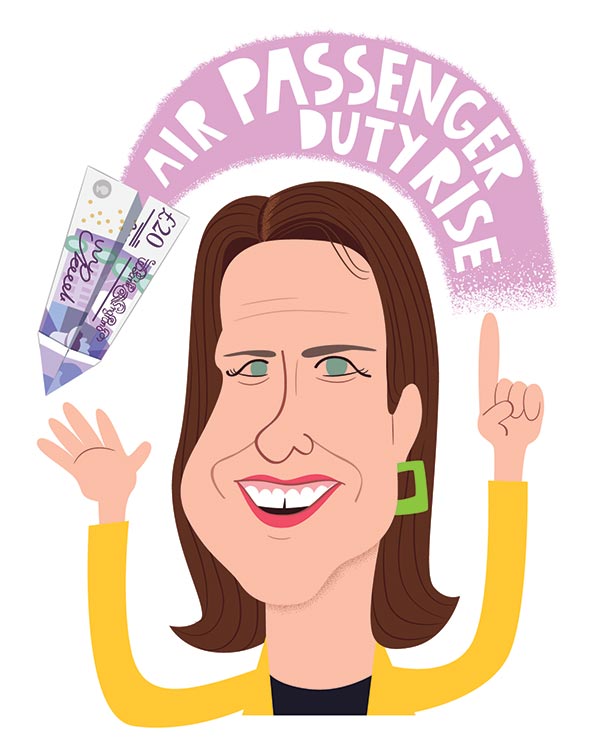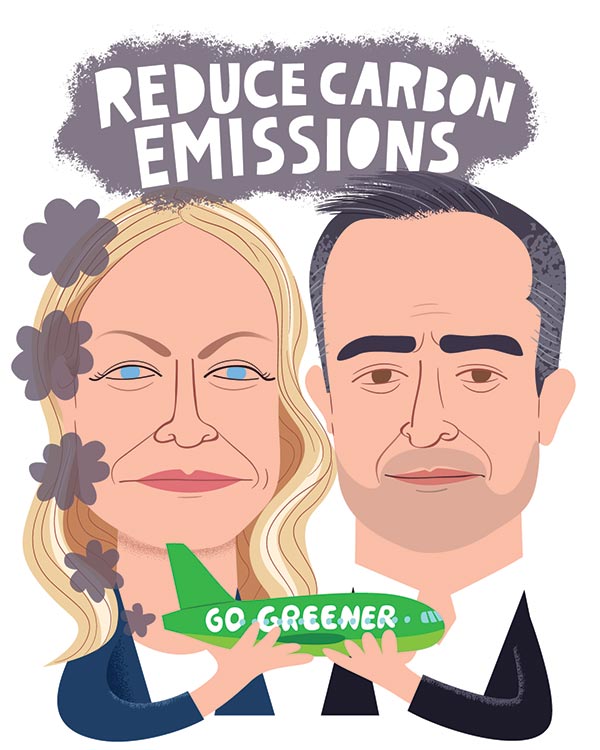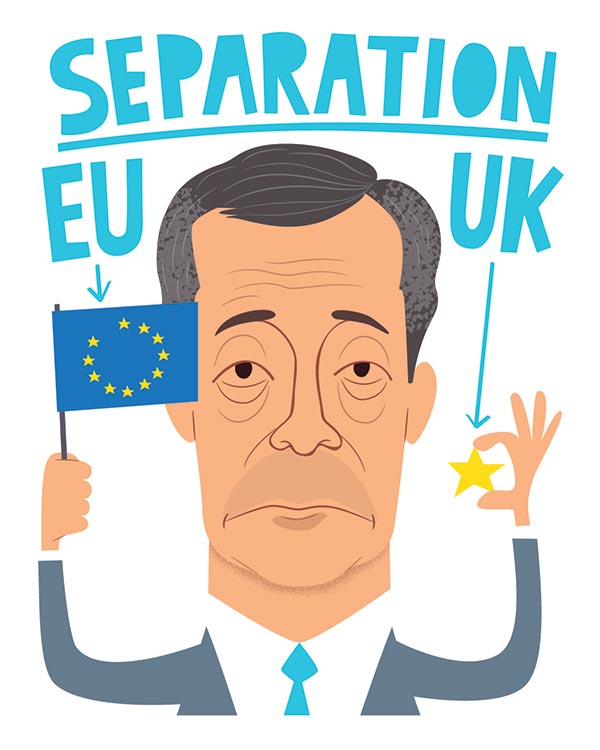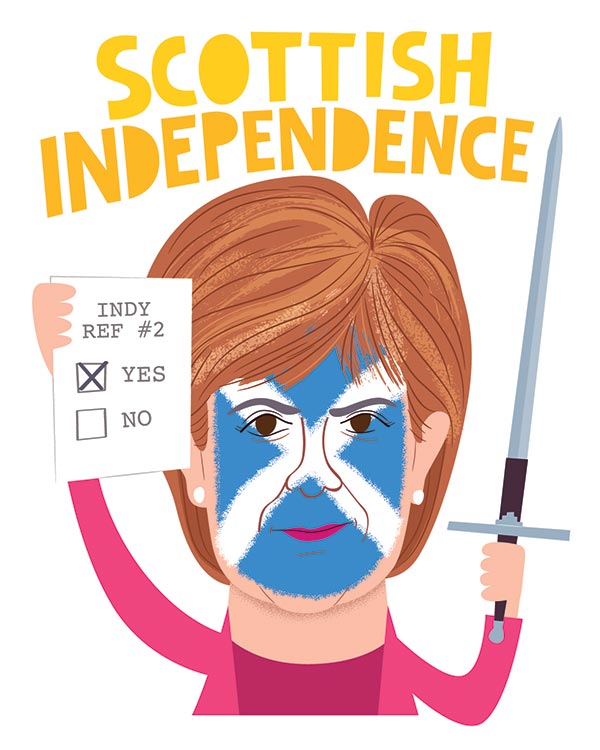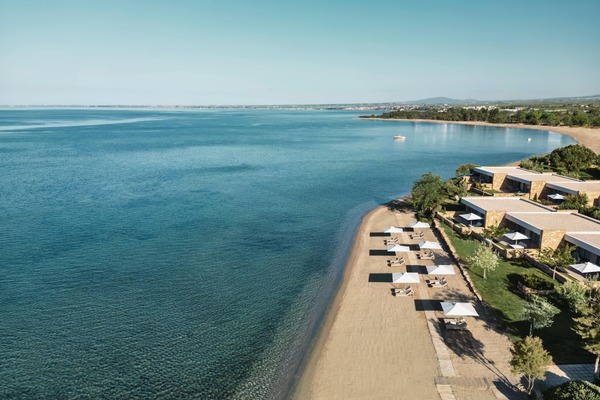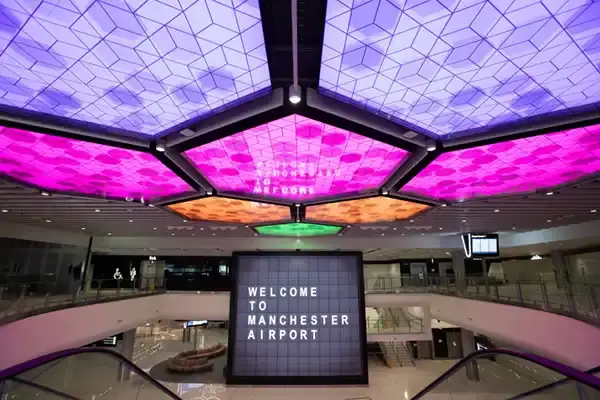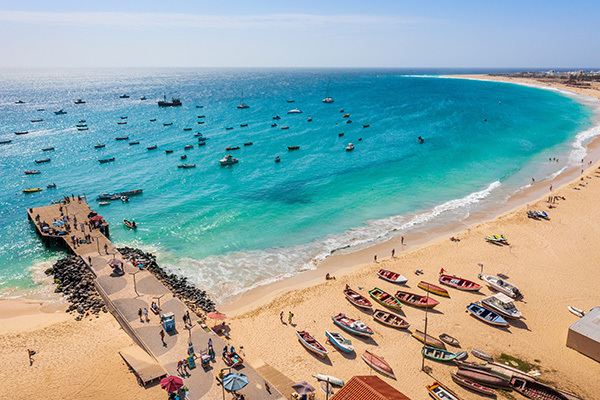What are the party leaders’ travel policies this election?
On 12 December, UK voters will decide who will lead the country. We summarise the main parties’ travel-related pledges.
Labour
1. Air Passenger Duty
There is no specific mention of APD in the Labour manifesto and a spokesperson did not respond to TTG’s request for clarification.
2. Business Rates
Labour is promising to review land value tax on commercial landlords as an alternative to business rates, which it describes as “causing real issues for high street retailers”.
The party would also develop a retail sector industrial strategy, but specific details of this are not included in its manifesto.
During a speech to the Confederation of British Industry on 18 November, leader Jeremy Corbyn elaborated: “Small businesses will see late payments tackled, whether those late payers are larger companies or government; business rates reformed, because we know the damage they’re currently doing to our high streets and communities; and access to finance improved with a Businesses Development Agency as part of the new Post Bank [based in Post Offices].”
Elsewhere, Labour plans to raise corporation tax to 26% by 2022.
3. Prioritising Tourism
There is just one mention of tourism in the Labour manifesto launched on 21 November.
In this section, the party promises to invest in “neglected” communities, with a £1 billion Cultural Capital Fund towards attractions such as museums and galleries, as well as libraries.
4. Airport expansion
In its manifesto, Labour said any airport expansion must pass its tests for “air quality, noise pollution, climate change obligations and countrywide benefits”.
It added: “We will examine fiscal and regulatory options to ensure a response to the climate crisis in a way that is fair to consumers and protects the economy.”
In June 2018, the party said the proposed Heathrow expansion did not meet its criteria, which include delivery of increased capacity and emissions reduction.
Last month, shadow chancellor John McDonnell suggested plans for the third runway would be scrapped. Instead, Labour is keen to focus on trains – including the renationalisation of the railway.
Conservatives
1. Air Passenger Duty
In its manifesto, the Conservative Party makes one mention of APD in a paragraph about Northern Ireland. It says it will consider devolving responsibility for short-haul APD to “serve our goal of making our union more prosperous and connected than ever before”.
2. Business Rates
In an attempt to “keep town centres vibrant”, the Conservatives have promised to conduct a review of the business rates system in order to reduce the charge for retail premises.
It has also been widely reported that current prime minister Boris Johnson would increase employment allowance from £3,000 to £4,000.
The Conservatives say they would postpone a reduction in the corporation tax rate from 19% to 17%.
3. Prioritising Tourism
The party’s manifesto does not specifically mention the tourism industry, except to say it will clamp down on “health” tourism, by which people travel to the UK to take advantage of the NHS. It stated it would “ensure that those from overseas who use NHS services pay their fair share”.
A spokesperson did not respond to request for clarification.
4. Airport expansion
In 2015, while he was mayor of London, Johnson controversially said he would “lie down in front of bulldozers” rather than see Heathrow’s expansion.
However, in 2018 the then-foreign secretary was absent while a key vote on the plans was taking place.
The Conservative government voted in principle to support the third runway, and its 2019 manifesto affirms this position.
However, it stresses the expansion will not receive any public money. “It is for Heathrow to demonstrate that the business case is realistic,” the party says.
Johnson has also promised to use new aviation technology to reduce delays and pollution, building on the possibility of electric and low-carbon flights.
Liberal Democrats
1. Air Passenger Duty
The Lib Dems would make APD a “green tax” to try to reach net-zero emissions by 2045. APD on a passenger’s first flight each year would be effectively zero, but would increase progressively for each subsequent journey.
This policy aims to cap passenger demand. They say this strategy would raise £4.8 billion a year by 2024/25 to be spent on infrastructure to tackle climate change.
A spokesperson said: “We believe reforming APD to target those who fly the most is the right thing to do.”
2. Business Rates
The party wants to scrap both non-residential stamp duty and business rates, replacing the latter with a commercial landowner levy. Businesses would not have to pay tax on their physical premises, but landlords would be charged an equivalent rate based on the value of the site. Lib Dems say it represents a tax cut for businesses in 92% of English local authorities, but would be “at least revenue-neutral in the long-term”.
It also says it will restore corporation tax to 20% and keep the rate stable.
3. Prioritising Tourism
Jo Swinson’s party says it would create a Department of Digital, Culture, Media, Sport and Tourism with a designated minister of state for tourism.
It would also enable local authorities to bring in tourist levies to fund local infrastructure.
A spokesperson said: “We are committed to supporting the tourist industry, which is vital for many local economies.”
4. Airport Expansion
Opposing any expansion of Heathrow, Gatwick or Stansted airports, the Lib Dems would place a temporary ban on any new runways in the UK.
They are also against any new airport in the Thames estuary, and would make zero-carbon fuel blending a requirement for domestic flights.
The Green Party
1. Air Passenger Duty
The Green Party would introduce a “frequent flyer levy”, which would apply to anyone who takes more than one return flight each year. Funds raised from the new tax would go towards a Green New Deal. This would see £100 billion invested in tackling climate change in an “economically friendly way”.
2. Business Rates
Abolishing both council tax and business rates, the Greens would bring in a Land Value Tax.
They would charge landowners about 1.4% of their property value each year, absorbing business rates, stamp duty, annual tax on enveloped dwellings [buildings tax], capital gains tax on land sales, inheritance tax and income tax for owner-occupiers.
The party also says it would increase the employment allowance by £7,000 to £10,000 per year – a tax cut it hopes would allow small firms to hire more people, increase wages or reduce prices.
It also plans to increase the rate of corporation tax to 24% and close loopholes in the way it is calculated.
3. Prioritising Tourism
The Green Party says it would invest in eco-tourism and associated schemes such as rewilding, habitat recovery and species reintroduction.
A Green Party spokesperson also told TTG it would support low-carbon tourism “that protects and improves the natural world”.
4. Airport Expansion
This party opposes all airport expansion because it “is not compatible with tackling the climate emergency”.
Its manifesto describes these projects as “wasteful spending”, alongside HS2, the Trident nuclear programme and the Help to Buy homebuying scheme.
“These are the worst-offending projects – our review of government spending is likely to consider further vanity projects that need a rethink,” the manifesto reads.
The Brexit Party
1. Air Passenger Duty
The Brexit Party does not have a specific policy for a number of issues, including APD, because it says it is not attempting to form the next government.
Last month, the party announced it would not contest any Conservative-held seats. However, a spokesperson told TTG the party’s general “strategic direction” is for lower and simpler taxes.
“Since we do not have aspirations, or present ourselves as, forming the next government, we have a targeted set of proposals that we believe can become mainstream and with which we hope we can lead the agenda,” said the spokesperson.
2. Business rates
Continuing this focus, the Brexit Party says it would replace business rates with a “simpler system”. Any revenue reductions would be funded with an online sales tax, but the spokesperson did not offer any specific details on how this might be implemented.
It has also pledged to make any business with a pre-tax profit less than £50,000 exempt from corporation tax.
3. Prioritising Tourism
Nigel Farage’s party would invest £2.5 billion in fishing and coastal communities, which a spokesperson said have “much potential” for tourism.
The manifesto – which it has coined a “Contract with the People” – reads: “The Brexit Party supports investment in key public services, the environment, fishing and strategic industries – partly financed by saving our annual contribution to the EU.”
According to the Office for National Statistics, the UK’s gross contribution to the EU technically came to £20 billion in 2018. However, this amount was never transferred, as it is a “theoretical liability”.
4. Airport Expansion
The Brexit Party has no policy on airport expansion. However, in an interview on Good Morning Britain in June 2018, Farage said Gatwick was a “more logical place” than Heathrow.
“If you just look at the traffic and the infrastructure around Heathrow, frankly during rush hour, it barely works now,” he said. “So the idea there will be a huge expansion there I am very sceptical about.
“A lot of the tourist holiday business could be pushed to other places.”
Scottish National Party
1. Air Passenger Duty
In 2016, the Scottish National Party (SNP) introduced a policy to cut APD by 50%. However, the party dropped these plans this summer, explaining in a statement they were “not compatible” with its target to deliver net-zero emissions by 2045.
“This is an important step in meeting our tougher climate targets and rising to the climate emergency challenge, and the government has not taken this decision lightly,” it said.
“We will continue to support our tourism industry, which is going from strength to strength, and we are committed to finding new ways to back the industry.”
2. Business Rates
The SNP-led government in Scotland has already introduced a Small Business Bonus Scheme to provide non-domestic rate relief worth £1.7 billion for small businesses in the country.
This year, it is offering a 10-year relief for new fibre broadband installations to help businesses.
3. Prioritising Tourism
The SNP would introduce an islands passport marketing scheme to encourage tourism to Scotland’s 80 inhabited islands.
A spokesperson said the country will carry on securing major tourism events, following on from the Commonwealth Games and Solheim Cup in recent years.
Glasgow’s Hampden Park is one of the venues for the Uefa European Championships 2020, and the city will host the first-ever UCI all-discipline Cycling World Championships in 2023.
“Scotland’s tourism industry is going from strength to strength – spending by tourists in Scotland generates around £12 billion,” said a spokesperson.
The SNP has also called on the UK government to examine a reduction in hospitality VAT to support tourism.
4. Airport Expansion
An SNP spokesperson did not provide any details on its policy regarding airport expansion. In 2016 the Scottish government signed a memorandum backing the Heathrow airport expansion because it was predicted to provide up to 16,000 new jobs in Scotland. However, this summer, the SNP announced a review of that policy.
Plaid Cymru
1. Air Passenger Duty
Plaid Cymru would like the devolution of Air Passenger Duty for Wales, as is the case in Scotland and Northern Ireland.
This has been on the party’s agenda for many years – in 2014, Plaid Cymru’s Jonathan Edwards told the House of Commons that it was “a slap in the face to Wales” that APD was not included in a Wales Bill.
At that time, a Parliamentary bid by Plaid to devolve APD was rejected.
2. Business rates
Not specifically mentioning business rates, the party would like to devolve corporation tax and reverse its planned cut from 19% to 17%.
The party would establish a formal relationship between the Welsh Government and the Consular Association in Wales to develop a strategy to enhance the Welsh economy.
3. Prioritising tourism
In its manifesto, Plaid’s manifesto reads: “We want to promote Wales as a high quality, sustainable tourism destination with activities and experiences based on our natural resources, our produce, our unique coastline and landscape, and our language, culture and heritage.
“We will increase funding for tourism promotion for Wales to take its place amongst the best destinations worldwide.”
It goes on to say the Welsh tourism industry is “held back by unfair taxes” – it would like to see tourism VAT on hospitality cut to 9%.
Additionally, it would establish a National Academy for the Welsh tourism sector to provide hands-on learning and advocate associate membership of the UN World Tourism Organisation.
It said it would “improve the tourist experience” by implementing joined-up services, giving hotels the latest tourism information, and making sure public transport is available.
4. Airport expansion
Plaid Cymru opposes the third runway at Heathrow, saying it would cost £14 billion.
If these “English projects” go ahead, Plaid said it would push for extra funding for Wales. It describes this as “a full proportionate share”.
DUP
1. Air Passenger Duty
The DUP would abolish domestic APD, branding it a “faux environmental tax that has a disproportionately negative impact on peripheral parts of the UK”.
2. Business Rates
This party’s manifesto does not specifically mention business rates, but Arlene Foster’s party says it would keep corporation tax rates under review “to ensure it remains competitive”.
It says it will also increase employment allowance for National Insurance to £4,000 and abolish the Apprenticeship Levy and replace it with a ringfenced private sector fee.
Citing the collapse of Thomas Cook, the DUP said it would overhaul corporate governance and audit to restore trust in business.
3. Prioritising Tourism
Although the DUP manifesto does not make any specific reference to the tourism industry, it does say it would introduce a same distance travelled policy with regard to climate emissions targets.
This would see each country in the UK given a different emissions target, reflecting “the distinct opportunities and challenges they face”.
It reads: “It must be recognised that Northern Ireland is the UK region with the greatest distance to travel and sectors that will be the most difficult to transform.”
4. Airport Expansion
The DUP has said a third runway at Heathrow airport is “the best solution for the UK”, on the condition of designated slots for regional connections.
It also said Northern Ireland is “well placed” to host one of the Heathrow construction hubs.
The party also supports “up-to-date airports”.
Sign up for weekday travel news and analysis straight to your inbox
Supplier Directory
Find contacts for 260+ travel suppliers. Type name, company or destination.
